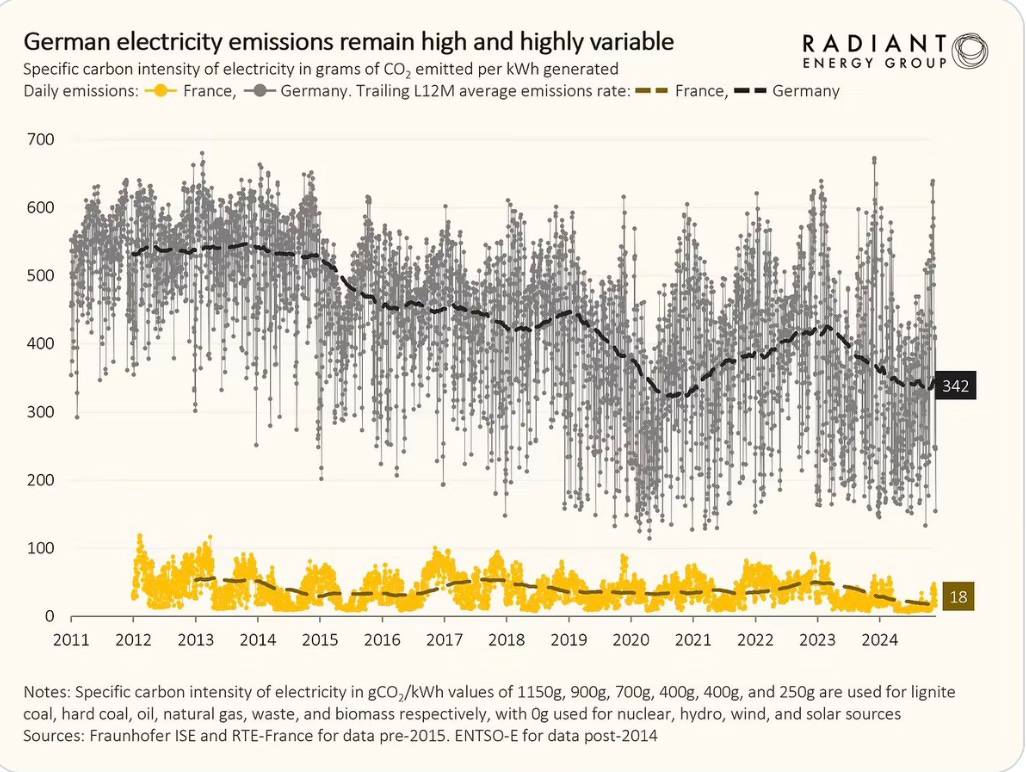• When I visited Germany more than 15 years ago as a guest of the government on a junket to learn in depth about their grand energy plans that became “Net-Zero,” every expert our delegation met with said the same thing: Germany will never make its ambitious emissions targets unless it kept its zero-emission nuclear power plants. The math just couldn't work. Yet Germany had put itself on course to phase out all of its nukes. Most everyone our group talked to expected the phaseout to be reversed.
But then, after Fukushima in 2011, Angela Merkel panicked (or had to give in to her irresponsible Green Party coalition partners) and accelerated Germany’s schedule to phase out nuclear power, even though no German nukes faced any risk from a tsunami as Fukushima did.
In any case, now that it is clear that Germany’s emission-reduction scheme has completely stalled out, and embarrassed by the fact that they often plugged electricity shortfalls by buying power from France (which means nukes!), Germany has finally reversed course and announced that it will not longer insist on anti-nuclear policies at at EU level:
Meanwhile, just how embarrassed is Germany that France makes them look foolish? This embarrassed:
But arguably more important that Germany’s about face is that both Denmark and Belgium have decided to reverse course on their anti-nuke policies, which go back decades in the case of Denmark. Apparently they’ve figured out that wind power isn’t going to cut it:
Belgium's federal parliament has voted by a large majority to repeal a 2003 law for the phase-out of nuclear power and banning the construction of new nuclear generating capacity.
Which brings us back to nuclear power in the United States. Looks like the GOP budget bill, which has multiple flaws, may cut government support for nuclear power, even as some red state Republicans want to keep Biden’s lavish subsidies for wind and solar power. Now, there’s a legitimate debate to be had about whether nuclear power subsidies are necessary, or whether regulatory relief would unleash new nuke designs, but even the French heavily subsidized their nuclear fleet. The Washington Post reports:
Earlier this week, two House committees released their sections of the bill, which includes cuts to key energy loan and tax credit programs. If enacted, the provisions would constitute the biggest setback to U.S. energy security in a generation — and nuclear energy would be hardest hit.
Might be a mistake.
• Speaking of policy reversals, Britain’s PM Kier Starmer put out a Tweet recently that suggested his X account had been hacked by Pat Buchanan:
There followed the announcement that his previous open-borders Labour Party was going to do an about-face, and start to limit immigration. Let’s see deeds match words.
What accounts for this reversal? Turns out Nigel Farage’sReform Party, which, like AfD in Germany, is at the top of party opinion polls in Britain right now, swept local government elections on May 1. You hardly heard about this American media, of course. Only the Wall Street Journal, just today and on the editorial page, has reported this fact:
Mr. Starmer’s Damascene conversion developed the night of May 1, when the results of that day’s local elections confirmed that, although the Conservatives are the parliamentary opposition, Nigel Farage’s anti-immigration Reform UK party is gaining significant ground. Mr. Starmer went to bed a cheerleader of woke platitudes and an avowed multiculturalist—the man who once said he’d rather be in Davos than Westminster. He arose possessed by the spirits of Enoch Powell and Pat Buchanan.
For more details, you need to consult The Spectator, which reported the full and shocking dimensions of the Labour/Tory joint wipeout in its May 10 issue:
Of 1,641 wards in England up for election, Reform won 677. The Tories lost 676, winning only 317. The Lib Dems gained 163, winning 370 in all. Labour lost 186, winning 99. Reform won control of ten of 23 councils in contention. . . The Tories lost all their 16 councils.
Suddenly the colorful—or should it be spelt “colourful”?—Nigel Farage isn’t looking so fringy. Spectator columnist James Heale makes the point:
Both of Farage’s previous enterprises—Ukip and the Brexit party—focused on a single concern. End the debate on Europe, his opponents thought, and you would end Farage, too. How, however, the party has a far more wide-ranging critique: the whole of Britain is broken. The message is working: YouGov puts Farage’s party on 29 points, seven points clear of Labour.
“The whole of Britain is broken.” Sounds familiar doesn't it?
Chaser:
Yeah, right.











Why do cuts to loans and tax credits constitute a setback to US energy security? The fact that this is being reported in the Washington Post also gives me pause. From what I can see, Mr Trump is bent on unleashing US energy production including clean coal.
Regarding those "red state Republicans" hanging on to those egregious green scam subsidies, they should be ashamed. Those idiotic windmills and Chicom bird roasters are a blight on the landscape and should be and should be shut down and destroyed.
Since carbon and carbon dioxide are the basis for all life on earth, "low carbon" policies sound like a death cult to me. Still, nukes will power AI and much else if allowed.